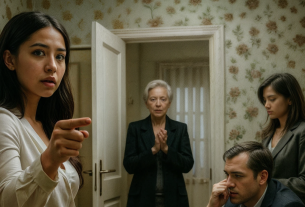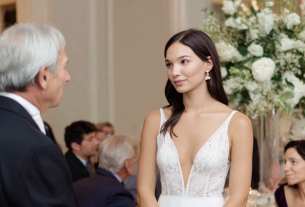Tatiana stepped over the morgue threshold at the very moment when the first silvery rays of morning light slid along the concrete walls, as if heralding something unusual. Her shift was just beginning, but within minutes everything around turned into a scene worthy of a dramatic film. An ambulance pulled up to the building; its siren abruptly stopped, as if nature itself had frozen in anticipation. And then, as if by magic, a whole wedding procession appeared behind it — snow-white limousines decorated with fresh flowers and ribbons fluttering in the wind like symbols of hope, love, and happiness. But this time, happiness had come right to death’s door.
Tatiana’s colleagues poured out of the morgue like magnets drawn to the spectacle. No one could believe what was happening: a wedding at a morgue was not just rare, it was something from the realm of fantasy, almost a mystical event. The air hung heavy with silence filled with anxiety and bewilderment. People whispered, pointed fingers, and some even pulled out their phones to capture this absurd moment. The work shift was changing, so a crowd had gathered outside — nurses, orderlies, pathologists — all in identical white coats, like ghosts watching life invade the realm of the dead.
Tatiana stayed aside. She stood against the wall, slightly in the shadows, as if afraid to be noticed. She had only recently started this job and had no friendly smiles or warm greetings behind her back. Colleagues glanced sideways, exchanged looks, but said little. Yet everyone knew — she had been in prison. No one spoke aloud or asked directly, but whispers spread down the corridors like fog: “She’s a killer,” “Did time for her husband,” “Served time for murder, now cleans floors.” These words hung in the air like heavy raindrops before a storm.
Tatiana did not seek the spotlight. She just wanted to survive. To break free from the past and start anew. But her past was not just dark — it was filled with pain, loneliness, and cruelty. She had spent six years in prison, serving a seven-year sentence for killing her husband. Not for theft, not for fraud — for the desperate act of grabbing a knife to defend herself in a moment of extreme terror.
Their marriage lasted only a year. The wedding was beautiful, like a fairy tale: a white dress, smiles, champagne, toasts. But by the second day after the ceremony, the smiling mask of her husband slipped. He turned into a beast — rude, cruel, merciless. Tatiana was an orphan, raised in a children’s home; she had no family, no one to stand by her side. Every day became torture. Beatings, humiliation, fear — all her daily reality. And one day, when he raised his hand against her again, her mind snapped. The knife flashed in her hand like lightning, and it was over.
The trial was harsh. The husband’s numerous and influential relatives demanded severe punishment. But the judge — an elderly woman with piercing eyes and a tired voice — said to the courtroom:
“For this, you don’t send someone to prison. For this, you thank them. The world has become cleaner.”
Tatiana got seven years. Six years later — parole. But the world behind bars proved simpler than the world outside. No one wanted to hire an ex-convict. Not in cafés, not in shops, not even as a cleaner. All doors were closed. And only by chance, passing by the morgue, she saw a notice: “Orderly needed. No experience required. Salary above average.” Her heart clenched. This was a chance. She came, honestly told them about herself, expecting rejection. But they hired her. Without extra words, without judgment.
The work was hard. The first nights she woke up drenched in cold sweat, hearing the knocking of doors and footsteps of guards in her mind. But gradually, the fear faded. Especially after the words of the old pathologist, Petr Efremovich — thin, gray-haired, his face carved with wrinkles like a life map.
“You should fear the living, girl,” he once told her with a smile, “these won’t touch anyone anymore.”
Those words became her mantra. She began to see the dead differently — not as ghosts, but as those who had already passed through pain, fear, and suffering. They were at peace. And she was still fighting.
And now, on this strange day, they brought a bride to the morgue. On a stretcher, covered with a sheet, holding flowers, in a wedding dress like a sleepy princess. Next to her stood the groom — young, handsome, but with eyes in which the light had gone out. He did not cry. He just stared. His gaze was empty, as if his soul had already left, leaving his body standing on the ground. Relatives tried to lead him away, but he resisted like a man who could not believe reality. When they finally took him away, he turned back and looked at the morgue as if it were the gates of hell.
Tatiana overheard the orderlies talking: the bride had been poisoned by her childhood friend. The one who stood beside her at the wedding, smiling with poison in her heart. It turned out the groom once loved that friend, but then met the bride — and everything changed. The friend couldn’t endure the betrayal, couldn’t accept that someone else took her place. And now, with an arrest behind her, she lost both love and friendship forever.
Tatiana passed by the stretcher and froze for a moment. The girl was stunningly beautiful. Her face was not twisted by pain; on the contrary — it shone with calmness, as if she were simply asleep. Her skin was fresh, rosy, as after a long sleep. Something was wrong with this. A dead body doesn’t look like that.
“Tatiana, finish in that box, clean here, and close up,” Efremovich’s voice interrupted her thoughts.
“Aren’t you going to perform an autopsy today?” she asked.
“No, I have to leave urgently. I’ll come early tomorrow.”
“Understood.”
“That’s good. These ones aren’t in a hurry,” he chuckled. “So they can wait.”
His words made her think again. Maybe working among the dead does make people philosophers? After all, every day here you face the end — and start to appreciate every moment of life.
When she finished cleaning, she stepped outside to breathe. The air was cool but fresh. And then she saw him — the groom. He sat on a bench opposite the morgue, hunched over like an old man. His figure seemed part of the night, blending into the twilight.
“Can I help you with something?” she asked softly.
He slowly raised his eyes.
“Can you take me to her?”
“No, I can’t. They’ll fire me. And no one else will hire me.”
He nodded, as if that didn’t surprise him.
“Why won’t they hire you?”
Tatiana looked at him and decided to be honest:
“I just got out of prison. I killed my husband.”
He nodded again.
“Sad. Has she not been autopsied yet?”
“No. Tomorrow.”
“I don’t want to leave. When I bury her… maybe I’ll leave too.”
“You can’t say that!” she exclaimed. “It’s hard, but you have to live.”
“I’ve made up my mind,” he said, turning his gaze away.
She understood — persuading him was impossible. But a thought sparked in her mind: she needed to inform his family. They should know what state he was in.
Returning inside, she suddenly noticed: the bride’s hand lay unnaturally. The body looked too… alive. Tatiana stepped closer, gently touched the hand — and gasped. It was warm. Soft. Like a sleeping person’s. The morgue was always cold. Bodies should be icy. This was impossible.
She rushed to her purse, heart pounding. Found an old cracked mirror. Returned and held it to the girl’s face. At that moment — it fogged up. Breath. Weak, almost imperceptible, but it was there.
“Valera!” she shouted, running into a young orderly. “Come with me!”
Valera — smart, composed, former head of his medical college group — didn’t ask questions. He saw the mirror, saw her eyes — and understood. He lifted his stethoscope to the girl’s chest.
“The heart is beating,” he whispered. “Very weakly, but it’s beating. Calling an ambulance!”
Tatiana ran outside.
“Your bride is alive!” she shouted, running to the groom.
He raised his eyes to her, in which light finally flickered that day.
“You’re not lying?”
“No! She’s alive!”
He jumped up like a revived dead man and rushed to the doors. At that moment, the stretcher was being carried out of the morgue.
“I’m coming with you!” he yelled.
“Who are you?” the doctor asked.
“I’m her husband,” he whispered, breaking into sobs. “We had our wedding today.”
The doctor nodded; his voice was sharp but urgent, as if every word was torn from the flesh of time:
“Into the car, quickly. Every minute is like a drop of blood that cannot be lost.”
Sirens wailed, lights flickered, and the ambulance sped forward, tearing the morning silence like a sword through fabric. The vehicle disappeared around the corner, leaving behind only a trail of dust and an echo of hope. Tatiana and Valera stood nearby, like two guards at the gates between life and death, watching her with looks full of incredible relief.
“Tatiana,” Valera quietly said as the trembling in her fingers finally subsided, “it seems today you saved a human life.”
He paused, weighing his words, then added,
“The doctor said if it weren’t for the morgue’s cold, if the body hadn’t slowed its metabolism… she wouldn’t have survived. The poison given was strange — not lethal, but a deep sleeping agent. So strong that breathing nearly stopped, pulse became imperceptible. It’s not poisoning. It’s… almost a simulation of death.”
Tatiana slowly wiped away tears that came on their own — not from fear, not from exhaustion, but from realization: she did what seemed impossible.
“Life for life,” she whispered, looking into the distance. “I took one… and gave back another.”
Valera heard her words. He did not judge. Did not seem surprised. Just smiled — that warm, sincere smile with which people greet dawn after a long sleepless night.
“Tatiana,” he said, “maybe we should have some tea? The place isn’t exactly cozy… but damn, today it became a place of miracles.”
She nodded. For the first time in many years, she felt she could simply… be.
“Outside?”
“Why not?” he smiled. “Here, where it all began.”
They headed to that very bench where the grief-stricken groom had recently sat. Now it seemed a symbol of rebirth — as if the earth itself remembered that here, in this place, a lost hope suddenly came alive.
Sitting together, Tatiana looked closely at Valera for the first time. He seemed young, but up close you could see the years had left their mark. Glasses gave him the look of a student, but his voice, gestures, and wrinkles near his eyes told another story. He was not just an orderly. He was someone who had been through more.
“After the army, I stayed on contract at a military hospital,” he began, stirring tea. “I saw doctors work under fire. Save those who seemed beyond saving. Saw mistakes… but also miracles. Real ones. Tanya, can I ask… what happened in your life?”
She fell silent. The air grew heavy. But in his eyes there was no judgment — only a readiness to listen. And she spoke. About the orphanage. About the marriage that turned into hell. About the hand raised against her for the hundredth time. About the knife. The trial. Six years behind bars.
When she finished, Valera said nothing banal. No “I understand,” no “It’s not your fault.” He simply looked at her and quietly said,
“You don’t need to torture yourself over him.”
Tatiana looked at him in amazement.
“You’re the first to say that — seeing me not as a criminal… but as a victim.”
Their tea grew cold, but their hearts did not.
Suddenly an old but well-kept car stopped by the morgue. Out stepped Petr Efremovich — gray-haired, cigarette in the corner of his mouth, bags under his eyes, but with a living fire in his gaze.
“Well, darlings, sitting still?” he asked with a smirk, approaching.
Valera smiled:
“In my practice, nothing like this before: a friend gave a friend not poison, but an ultra-strong sleeping agent. If the dose had been a little higher — she wouldn’t have woken up. Ever.”
Efremovich sighed heavily, looked at the morgue, and shook his head:
“Good thing I decided not to do the autopsy today. Otherwise…” he trailed off, but everyone understood.
Tatiana looked at him, her heart tightening at the thought:
“Never thought such a thing was possible. That death can be a deception. That life can return.”
The next morning she left the morgue feeling something had changed inside her. She was no longer the one who just cleaned floors, hid in the shadows, and feared being noticed. She was the one who saw breath where others saw only death.
At the bus stop, a car screeched to a halt.
“Tatiana, get in, I’ll give you a ride,” Valera’s voice called out.
She froze. Those who had avoided her, glanced sideways, whispered behind her back — now someone offered help. Looking back, she saw orderlies smoking by the morgue doors, watching them with distrust and anger.
Valera looked in the rearview mirror and smiled:
“Does their opinion matter to you?”
Tatiana hesitated. Then got in.
Thus began their morning rides. Days turned into weeks. And one day, standing by the morgue doors, Valera suddenly said:
“Tanya, maybe we should go to the movies? Or a café?”
She shook her head:
“Why would you want that? You know who I am. That I was in prison.”
“And I fought,” he answered calmly. “Shot people. Killed. Not with a toy gun. You think I’m cleaner? No. We both went through hell. But now we’re here. And that’s all that matters.”
That evening, while cleaning the corridor, Tatiana felt a warm feeling spread through her chest — not fear, not shame, but hope. She hadn’t yet said “yes,” but she already dreamed of sitting with him in a small cozy café, laughing, talking about simple things. She wanted to live. For real.
Suddenly a rough voice came from the break room:
“Valera, are you crazy? Why do you need this? You wanna play?”
“It’s my business,” he snapped. “And no one else’s.”
“You’ve lost it! She went to prison! Why do you want this?” the orderly kept pushing.
A minute later Valera came out into the corridor, rubbing his fist.
“Listen,” he said, looking straight at the offender, “one more bad word about Tanya — and you’ll be a morgue patient yourself.”
The orderly backed off, snorted:
“You’re all crazy here.”
Tatiana looked at Valera, who firmly grabbed her elbow.
“This can’t go on,” he said. “Tanya, I like you. For real. And I want to be with you. We need to change something.”
She was confused, wanted to say something, but suddenly a voice sounded nearby:
“What do you mean? You need to get married! We’ll organize a wedding and celebrate in style!”
She turned and saw them. That very groom and his bride. The girl, pale but alive, was smiling brightly.
“You simply must agree,” she said. “You’re a wonderful couple. And we want to thank you. For giving me back my life.”
But Valera and Tatiana refused the lavish celebration. They were too grown-up, too much had happened to play dress-up.
“A simple ‘yes’ is enough,” Valera said.
Then the newlyweds gave them a gift — a honeymoon by the sea.
“Have you ever seen the sea?” Valera asked.
“Never,” she whispered.
A few days later, Tatiana submitted her resignation.
“I’ll find something of my own,” she said.
“For now,” Valera smiled, “my job is to take care of you. To make you happy. To protect you.”
And when they stood by the shore, watching the waves crash on the sand, Tatiana felt for the first time in many years: she hadn’t just survived.
She had started to live.
And the endless blue sea seemed to whisper:
“You deserved this.”



